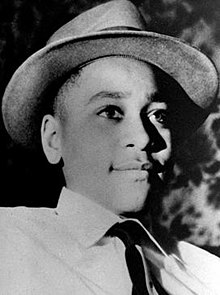
Back إيميت تيل Arabic ايميت تل ARZ Emmett Till AST Emmett Till AZ Emmett Till Czech Emmett Till German Emmett Till EO Emmett Till Spanish Emmett Till ET امت تیل FA
Emmett Till | |
|---|---|
 Till in a photograph taken by his mother on Christmas Day, 1954 | |
| Born | Emmett Louis Till July 25, 1941 Chicago, Illinois, U.S. |
| Died | August 28, 1955 (aged 14) Drew, Mississippi, U.S.[1] |
| Cause of death | Lynching (bullet wound and mutilation) |
| Resting place | Burr Oak Cemetery, Alsip, Illinois |
| Education | James McCosh Elementary School |
| Parents | |
| Awards | Congressional Gold Medal (posthumous, 2022) |
Emmett Louis Till (July 25, 1941 – August 28, 1955) was a 14-year-old African American youth who was abducted and lynched in Mississippi in 1955 after being accused of offending a white woman, Carolyn Bryant, in her family's grocery store. The brutality of his murder and the acquittal of his killers drew attention to the long history of violent persecution of African Americans in the United States. Till posthumously became an icon of the civil rights movement.[2]
Till was born and raised in Chicago, Illinois. During summer vacation in August 1955, he was visiting relatives near Money, Mississippi, in the Mississippi Delta region. Till spoke to 21-year-old Carolyn Bryant, the white, married proprietor of a local grocery store. Although what happened at the store is a matter of dispute, Till was accused of flirting with, touching, or whistling at Bryant. Till's interaction with Bryant, perhaps unwittingly, violated the unwritten code of behavior for a black male interacting with a white female in the Jim Crow-era South.[3] Several nights after the encounter, Bryant's husband Roy and his half-brother J. W. Milam, who were armed, went to Till's great-uncle's house and abducted Till, age 14. They beat and mutilated him before shooting him in the head and sinking his body in the Tallahatchie River. Three days later, Till's mutilated and bloated body was discovered and retrieved from the river.
Till's body was returned to Chicago, where his mother insisted on a public funeral service with an open casket, which was held at Roberts Temple Church of God in Christ.[4] It was later said that "The open-coffin funeral held by Mamie Till Bradley[a] exposed the world to more than her son Emmett Till's bloated, mutilated body. Her decision focused attention on not only American racism and the barbarism of lynching but also the limitations and vulnerabilities of American democracy."[5] Tens of thousands attended his funeral or viewed his open casket, and images of Till's mutilated body were published in black-oriented magazines and newspapers, rallying popular black support and white sympathy across the United States. Intense scrutiny was brought to bear on the lack of black civil rights in Mississippi, with newspapers around the U.S. critical of the state. Although local newspapers and law enforcement officials initially decried the violence against Till and called for justice, they responded to national criticism by defending Mississippians, giving support to the killers.
In September 1955, an all-white jury found Bryant and Milam not guilty of Till's murder. Protected against double jeopardy, the two men publicly admitted in a 1956 interview with Look magazine that they had tortured and murdered Till, selling the story of how they did it for $4,000 (equivalent to $45,000 in 2023).[6] Till's murder was seen as a catalyst for the next phase of the civil rights movement. In December 1955, the Montgomery bus boycott began in Alabama and lasted more than a year, resulting eventually in a U.S. Supreme Court ruling that segregated buses were unconstitutional. According to historians, events surrounding Till's life and death continue to resonate.
An Emmett Till Memorial Commission was established in the early 21st century. The county courthouse in Sumner was restored and includes the Emmett Till Interpretive Center. 51 sites in the Mississippi Delta are memorialized as associated with Till. The Emmett Till Antilynching Act, an American law which makes lynching a federal hate crime, was signed into law on March 29, 2022, by President Joe Biden.[7]
- ^ Thompson, Wright (July 22, 2021). "His name was Emmett Till". The Atlantic. Retrieved July 24, 2021.
- ^ Brown, DeNeen L. (July 12, 2018). "Emmett Till's mother opened his casket and sparked the civil rights movement". The Washington Post. Retrieved February 26, 2020.
- ^ Cite error: The named reference
Pérez-Peña-2017was invoked but never defined (see the help page). - ^ Brandon, Elissaveta M. "Eleven historic places in America that desperately need saving". Smithsonian. Retrieved October 20, 2020.
- ^ White, Deborah Gray; Bay, Mia; Martin, Waldo E. Jr. (2013). Freedom on My Mind: A History of African Americans, with Documents. Boston: Bedford/St. Martin's. p. 637. ISBN 978-0-312-64884-8.
- ^ "Getting Away with Murder". American Experience. PBS. Retrieved April 9, 2022.
- ^ McDaniel, Eric; Moore, Elena (March 29, 2022). "Lynching is now a federal hate crime after a century of blocked efforts". NPR. Retrieved March 29, 2022.
Cite error: There are <ref group=lower-alpha> tags or {{efn}} templates on this page, but the references will not show without a {{reflist|group=lower-alpha}} template or {{notelist}} template (see the help page).